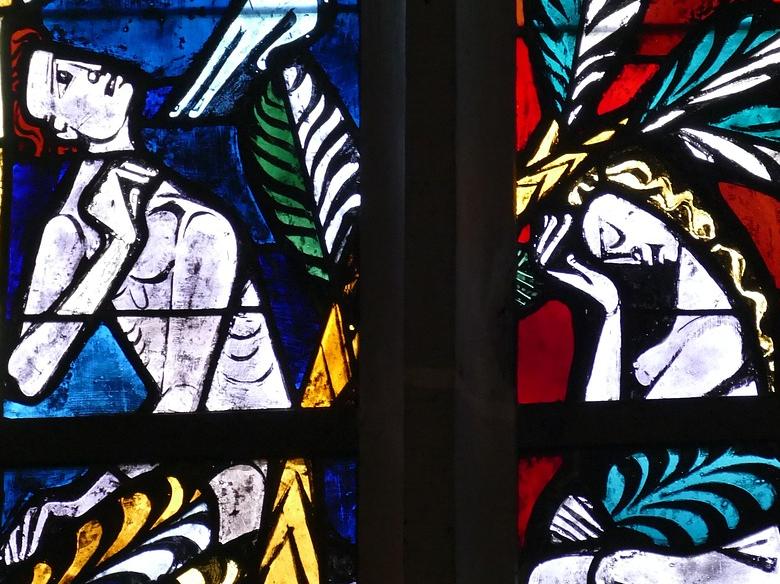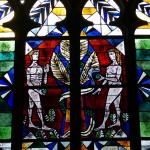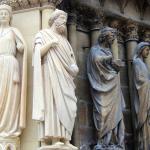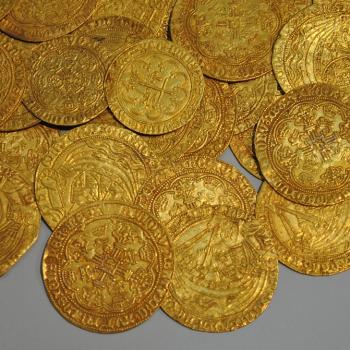
Image by falco / Pixabay
In the previous article, we saw the lack of Original Sin in Islam and Judaism. Neither Judaism nor Islam hold Original Sin as a foundational element for their understanding of God. However, there is a branch of Judaism that interprets Genesis 1-3 in what we know as Original Sin.
But – how do we know this?
Arguing FOR Original Sin in Judaism
John Towes (the historian from the las post – remember?) makes an important note. ““The unequivocal rejection of hereditary sinfulness in this literature does suggest that some people or groups contemporaneous with the writers were making the case for the hereditary transmission of sin from Adam as a way to explain the problem of evil in the world. The writers of 4 Ezra and 2 Baruch say a clear “no” to that theology around the turn of the first to second century CE.” Basically, there was so much written about original sin not being valid because Jewish writers were combatting this fringe idea.
Original Sin can also be argued for because Christianity grew as a Jewish subset. The Apostle Paul – a Jewish convert to Christianity and author of several letters in the New Testament – would have been very familiar with the text. Paul’s letter to the church in Rome, specifically chapter 5, is where we find debate. Theologian Matthew Umbarger says that Romans 5 should be read as apocalyptic. Paul pulls from the same texts that would support original sin, therefore Paul was proposing original sin like 2nd temple Judaism. Except that Jesus was payment for the debt, not as a cure for Original Sin.
Sin in the Eastern Church
For the Church in the first five centuries CE, the schools of thought were pretty well divided by language. The Greek-speaking Church of the East in Asia Minor and Palestine and the Latin-speaking Church of the Western Mediterranean. The Eastern school saw sin as a sickness that could be cured, while the Latin Church of the West saw it as a hereditary curse that was inescapable.
The first 250 years of Eastern thought on Original Sin was developed by Justin Martyr, Theophilus, Ireneas of Lyons, Clement of Alexandria, and Origen. This view of humanity saw the Fall of humanity in the Garden as an immature act rather than overt rebellion. This immaturity – with Irenaes arguing that Adam and Eve were literal children – led to, according to Theophilus, them eating before they were old enough. It was the Serpent (or Satan) that tricked Adam and Eve to disobey.
“Adam’s first sin was one of thoughtlessness rather than of malice. The primary blame for Adam’s misstep rests with the devil who acquired power over him unfairly, by a trick. It is not surprising that Irenaeus did not attach a high degree of guilt or culpability to Adam’s sin. God pitied, rather than condemned, his frail, imperfect, inexperienced creature for succumbing to the wiles of a cunning and powerful foe. The sin of Adam was far less serious than Cain’s. Adam’s transgression, though not an infection transmitted to subsequent generations, did lead to death, which Irenaeus also interpreted as a divine mercy.” – Towes
Origen of Alexandria, the student of Clement, continued to develop the idea of the universal Adam that Clement started. “Adam” in the Genesis story is not an individual, but rather humanity as a whole. While Origen uses theological and philosophical moves that are beyond this paper, it is important to note that there is a consistent theology of the world and humanity’s inclination to sin without the need of Original Sin.
Sin in the Western Church
The Western School, starting with Tertullian in 200 CE, took a different approach. He viewed sin as a trait that was passed down. Specifically, he saw that sex was the way sin was hereditarily moved from generation to generation. Part of the soul of the man is transplanted into the woman. “If all human souls are detached portions of the original soul which sinned, they must bear the moral responsibility for the primordial sin.”
Other Church thinkers like Cyprian, Ambrose, and Ambrosiaster continued to push this idea further in the West. They sought to widen the gap between secular and sacred. Ambrose’s idea of the perfect Adam, or that Adam and Eve were made perfect before the expulsion from the garden, only intensified the trespass they committed. He also equated the sin in the story with pride. Adam and Eve wanted to be like God, knowing good from evil.
One exception to this group is Ambrosiaster. There is almost no information regarding him or his life. However, we do know he wrote a commentary of the book of Romans. Unfortunately, he only had a simple understanding of Greek and a poorly translated Latin manuscript. Ambrosiaster’s mistranslation of a key phrase due to a bad translation (in ho, or ‘in whom’, rather than eph ho, or ‘on account of’ or ‘because of’) was passed along.
Christianity in the first four hundred years was divided East and West on the idea of hereditary sin. The Eastern Church, writing in Greek, believed that humanity was ultimately good. They used the story of Adam and Eve to make archetypal claims about the world and God. The Western, Latin Church saw humanity as permanently scarred. This defection, passed along through the man during sex, was ontologically shifting. A poor translation from Ambrosiaster will change the course of Christianity.
What Now?
Again, Original Sin is not a universally held position. The Eastern Churches still hold a view that humanity is ultimately good. Even with this frame, humanity was (and is) immature and in need of guidance. Many find this view – and the ultimate outcomes – as troubling. If we don’t agree with Original Sin, we are in good company.
 Brad is a graduate student at Northwind Theological Seminary studying theology and the changing religious landscape in America. He works as a co-investigator at the University of Rhode Island’s College of Pharmacy providing education and support for rural New Englanders impacted by the opioid epidemic. Brad spends nights and weekends playing in regional bands as a bassist, guitarist, and vocalist. When not at a computer, he loves to spend time with his wife and chasing his toddler around the house. You can go to his website to get updates on his writing and other events.
Brad is a graduate student at Northwind Theological Seminary studying theology and the changing religious landscape in America. He works as a co-investigator at the University of Rhode Island’s College of Pharmacy providing education and support for rural New Englanders impacted by the opioid epidemic. Brad spends nights and weekends playing in regional bands as a bassist, guitarist, and vocalist. When not at a computer, he loves to spend time with his wife and chasing his toddler around the house. You can go to his website to get updates on his writing and other events.













